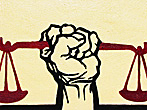Swazis vow to continue pro-democracy protests after police crackdown

Swaziland’s democratic movement remains defiant and resolute in the face of police intimidation and brutality.
“As we wind down the day, it would be folly for the government to think we’ve retreated. We’re going to reenergize ourselves, to regroup and to mobilise more so that we come back stronger,” Mary Pais Da Silva of the Swaziland Democracy Campaign said in a press statement about today’s protests and strikes for democratic reform in Swaziland. “These waves that are coming at them shall gather into the tsunami that shall push us into the democratic Swaziland that we fight for. We have been arrested, detained, assaulted, but we are not beaten.”
April 12 is an important day in the history of Swaziland. On that day in 1973, the king banned all political parties and declared a state of emergency. Since then, the monarchy has ruled by decree with increasing brutality and financial mismanagement, leaving two thirds of the population to survive on less than a dollar a day while the monarch splashes out money on prestige projects, palaces for his thirteen wives, and luxury items.
Swaziland’s democratic movement therefore uses the symbolic value of April 12 to protest against Swaziland’s absolute monarchy and demand democratic reforms and socio-economic justice. Which is why the Swazi regime tries to stop any such protests by way of court bans on legal demonstrations and innumerable roadblocks every year, and failing this turn Swaziland’s larger towns into a virtual battle zone of police brutality and detentions.
This year is no exception. The police and army have broken up any groups however small, detained people right, left and centre and manhandled several protesters, thereby making any organised protest very difficult indeed.
Among those who were detained was Muzi Mhlanga, Secretary General of the Swaziland National Association of Teachers and one of the main organisers of the strikes and protest actions. For no apparent reason, it would seem. “As is the norm, the activists were not charged nor were they given valid reasons for their detainment,” said Mary Pais Da Silva of the Swaziland Democracy Campaign.
Others, including Mdudu Gina, First Deputy Secretary General of Swazi trade federation TUCOSWA, were banned from entering the industrial centre Manzini, which together with the capital Mbabane is where the largest protests are held. “The government has declared an open war on trade unionists in all cities and towns as armed forces are holding roadblocks and harassing anyone wearing a union T-shirt in all roads leading to Mbabane and Manzini,” TUCOSWA told the Times of Swaziland.
And others still have been brutalised by the police. “Swaziland United Democratic Front Project Organiser, Gugu Malindzisa, has been manhandled and ruthlessly snatched out of a public transport bus on her way to the protest action by police at a roadblock,” Wandile Dludlu from the Swaziland United Democratic Front told Africa Contact.
“The events of April 12 again hit a snag this year,” student leader Sibusiso Nhlabatsi tells Africa Contact. “There was a heavy presence of police and the army. It was difficult to organize anything. No one was allowed near where the march was supposed to commence. People walking in pairs were confronted by police as they wanted to know the nature of their conversations.”
But as they try and regroup after today’s onslaught, the democratic movement can take heart from the many expressions of support for their cause from around the world.
In neighbouring South Africa, the trade federation COSATU and several other organisations have sent messages of solidarity. “The struggle continues. Despite the roadblocks, and fishing raids to arrest and detain known democracy activists, there is a palpable change taking place in Swaziland. The people are no longer intimidated. Nothing will ever be the same again,” wrote Stephen Faulkner from the South African Municipal Workers Union.
And in Europe, Danish solidarity movement Africa Contact urged Swazis to “keep fighting the good fight” in a similarly worded message. “As the struggles against the apartheid regime and the North African regimes show, when a determined population stand up in unison to demand democracy and socio-economic justice no regime, police force or manner of indoctrination can stop them.”
* BROUGHT TO YOU BY PAMBAZUKA NEWS
* Please do not take Pambazuka for granted! Become a
Friend of
Pambazuka and make a donation NOW to help keep Pambazuka FREE
and INDEPENDENT!
* Peter Kenworthy writes for Africa Contact
* Please send comments to editor[at]pambazuka[dot]org or comment online at Pambazuka News.
